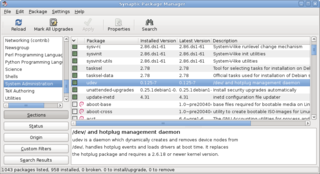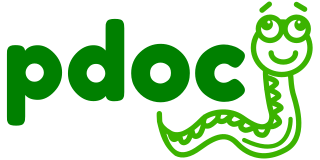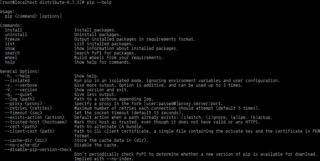The Comprehensive Perl Archive Network (CPAN) is a repository of over 250,000 software modules and accompanying documentation for 39,000 distributions, written in the Perl programming language by over 12,000 contributors. CPAN can denote either the archive network or the Perl program that acts as an interface to the network and as an automated software installer. Most software on CPAN is free and open source software.

Python is a high-level, general-purpose programming language. Its design philosophy emphasizes code readability with the use of significant indentation.

A package manager or package-management system is a collection of software tools that automates the process of installing, upgrading, configuring, and removing computer programs for a computer in a consistent manner.

The Yellowdog Updater Modified (YUM) is a free and open-source command-line package-management utility for computers running the Linux operating system using the RPM Package Manager. Though YUM has a command-line interface, several other tools provide graphical user interfaces to YUM functionality.

Portage is a package management system originally created for and used by Gentoo Linux and also by ChromeOS, Calculate, Sabayon, and Funtoo Linux among others. Portage is based on the concept of ports collections. Gentoo is sometimes referred to as a meta-distribution due to the extreme flexibility of Portage, which makes it operating-system-independent. The Gentoo/Alt project was concerned with using Portage to manage other operating systems, such as BSDs, macOS and Solaris. The most notable of these implementations is the Gentoo/FreeBSD project.
GNU Radio is a free software development toolkit that provides signal processing blocks to implement software-defined radios and signal processing systems. It can be used with external radio frequency (RF) hardware to create software-defined radios, or without hardware in a simulation-like environment. It is widely used in hobbyist, academic, and commercial environments to support both wireless communications research and real-world radio systems.

A LAMP is one of the most common software stacks for the web's most popular applications. Its generic software stack model has largely interchangeable components.
RubyGems is a package manager for the Ruby programming language that provides a standard format for distributing Ruby programs and libraries, a tool designed to easily manage the installation of gems, and a server for distributing them. It was created by Chad Fowler, Jim Weirich, David Alan Black, Paul Brannan and Richard Kilmer during RubyConf 2004.
A software repository, or repo for short, is a storage location for software packages. Often a table of contents is also stored, along with metadata. A software repository is typically managed by source or version control, or repository managers. Package managers allow automatically installing and updating repositories, sometimes called "packages".

Pdoc is a software package for generating API documentation for Python programming language. Built as a successor to Epydoc, Pdoc uses introspection to extract documentation from source code docstrings and allows programmers to generate HTML documentation for chosen Python modules. It is thus functionally similar to Pydoc, Perldoc and Javadoc. It supports identifier cross-linking and Markdown for its doc string format.

The Python Package Index, abbreviated as PyPI and also known as the Cheese Shop, is the official third-party software repository for Python. It is analogous to the CPAN repository for Perl and to the CRAN repository for R. PyPI is run by the Python Software Foundation, a charity. Some package managers, including pip, use PyPI as the default source for packages and their dependencies.
Python Package Manager (PyPM) is a Python utility intended to simplify the tasks of locating, installing, upgrading and removing Python packages. It can determine if the most recent version of a software package is installed on a system, and can install or upgrade that package from a local or remote host.

pip is a package-management system written in Python and is used to install and manage software packages. The Python Software Foundation recommends using pip for installing Python applications and its dependencies during deployment. Pip connects to an online repository of public packages, called the Python Package Index. Pip can be configured to connect to other package repositories, provided that they comply to Python Enhancement Proposal 503.
LuaRocks is a package manager for the Lua programming language that provides a standard format for distributing Lua modules, a tool designed to easily manage the installation of rocks, and a server for distributing them. While not included with the Lua distribution, it has been called the "de facto package manager for community-contributed Lua modules".
Pylons Project is an open-source organization that develops a set of web application technologies written in Python. Initially the project was a single web framework called Pylons, but after the merger with the repoze.bfg framework under the new name Pyramid, the Pylons Project now consists of multiple related web application technologies.
CocoaPods is an application level dependency manager for Objective-C, Swift and any other languages that run on the Objective-C runtime, such as RubyMotion, that provides a standard format for managing external libraries. It was developed by Eloy Durán and Fabio Pelosin, who continue to manage the project with the help and contributions of many others. They began development in August 2011 and made the first public release on September 1, 2011. CocoaPods is strongly inspired by a combination of the Ruby projects RubyGems and Bundler.

KDE Frameworks is a collection of libraries and software frameworks readily available to any Qt-based software stacks or applications on multiple operating systems. Featuring frequently needed functionality solutions like hardware integration, file format support, additional graphical control elements, plotting functions, and spell checking, the collection serves as the technological foundation for KDE Plasma and KDE Gear. It is distributed under the GNU Lesser General Public License (LGPL).

Anaconda is a distribution of the Python and R programming languages for scientific computing, that aims to simplify package management and deployment. The distribution includes data-science packages suitable for Windows, Linux, and macOS. It is developed and maintained by Anaconda, Inc., which was founded by Peter Wang and Travis Oliphant in 2012. As an Anaconda, Inc. product, it is also known as Anaconda Distribution or Anaconda Individual Edition, while other products from the company are Anaconda Team Edition and Anaconda Enterprise Edition, neither of which is free.










